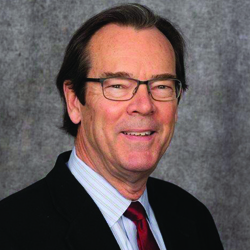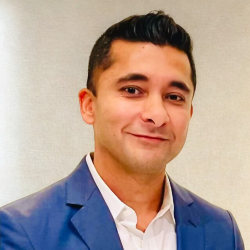Clinical Researcher—August 2019 (Volume 33, Issue 7)
EXECUTIVE DIRECTOR’S MESSAGE
Jim Kremidas
From the Philip K. Dick novel-turned-miniseries The Man in the High Castle to Philip Roth’s novel (and soon-to-be miniseries) The Plot Against America, alternate history in science fiction and fantasy can be thought-provoking as it contrasts our real world against an artist’s “what if” conception of how a change in the way things went in the past might lead to a different reality for our lives today. Fictional though they be, if skillfully presented, these alternate worlds can remind us of what we’ve gained or lost by how our own reality has played out so far.
Whether it’s in the pages of 11/22/63 by fright master Stephen King or in a more family-friendly film like Frank Capra’s It’s a Wonderful Life, alternate history scenarios often focus on something not happening (e.g., President John Kennedy isn’t assassinated or George Bailey is never born) or different outcomes of important events (e.g., Germany and Japan winning World War II, as depicted in High Castle, or Franklin D. Roosevelt losing his presidential re-election bid to Charles Lindbergh in 1940, as explored in Roth’s book).
There are a few possible reasons I’ve had alternate history on my mind recently. I’ve had the opportunity to do a lot of traveling in the past few months to represent ACRP at various industry functions. Sometimes I’m a speaker and other times I’m an attendee learning from thought leaders with unique perspectives and accomplishments.
Maybe it’s the chance to daydream on that airplane to Chicago or the Acela to Philadelphia, but of late I’ve been thinking about an alternate history for the clinical trial workforce. And like the best science fiction, what just a few years ago seemed out of reach or even outlandish is beginning to look quite possible.
In my alternate history daydreams, the clinical trial workforce is well trained, with clear career paths and certifications grounded in meaningful skills and core competencies. The benefits are obvious. Turnover declines. Burnout recedes. Drugs are approved more efficiently and safely. Patients live longer, better lives.
Watching and reading alternate history stories can be entertaining, angering, and frustrating, particularly when they get dystopian. But they also remind us that we can control much of our own destiny when it comes to many aspects of our own lives. We can demand—and manufacture—a better kind of future.
For example, last month your association and the Society for Clinical Research Sites (SCRS) announced a new partnership to offer SCRS clinical research site members complimentary Good Clinical Practice and ethics training. Under the partnership, SCRS member organizations and their clinical research teams will have immediate access to two of ACRP’s industry-leading online, on-demand training programs at no cost:
- Introduction to Good Clinical Practice (GCP)
- Ethics and Human Subject Protection: A Comprehensive Introduction
It’s just one of the many projects we’ve undertaken in 2019. Another is our new partnership with the Alliance for Clinical research Excellence and Safety (ACRES) as it rolls out its program to accredit clinical research sites worldwide. There will be lots more to share in the coming months.
Let’s keep working hard together to advance the professionalization of the clinical trial workforce. Let’s keep building new certifications and training modules. In this manner, a highly skilled and well-trained clinical trial workforce is moving quickly from the wish list to reality, and I want to thank you for all you’ve done to help in this important work.
As always, feel free to reach out to me with your thoughts and concerns about the exciting future of clinical research that we will all get to share.
Jim Kremidas (jkremidas@acrpnet.org) is Executive Director for ACRP.



